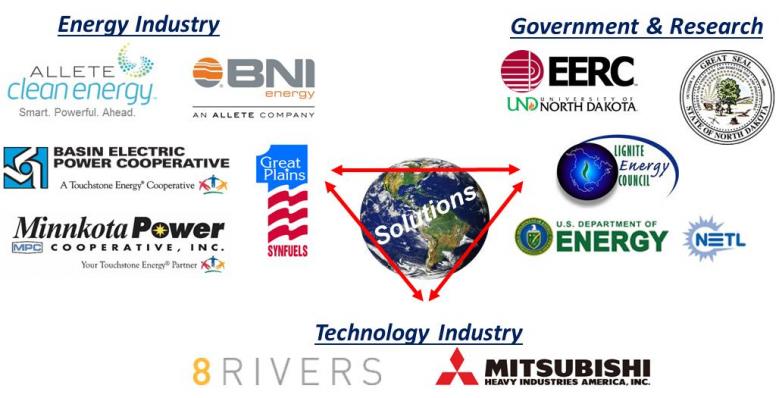
Carbon Solutions Project Partner Page
Carbon solution projects are not achievable without strong partnerships and committed partners across private industry, federal and state governments, and research & development agencies. The success of our North Dakota initiatives is predicated on the effective public-private partnerships that have been established, and we are proud to be aligned with the following key organizations in our carbon pursuits.
Partner Summaries:
ALLETE Clean Energy & BNI Energy
ALLETE Clean Energy is a subsidiary of ALLETE, Inc. a diversified energy company. ALLETE Clean Energy specializes in developing, acquiring and managing clean and renewable energy projects to create energy solutions by way of wind, solar, biomass, hydro, natural gas, shale resources, clean coal technology and other emerging technologies. ALLETE Clean Energy owns and operates wind generation facilities in Minnesota, Iowa, Oregon and Pennsylvania, and seeks opportunities to develop or acquire mid-size capital projects for electric utilities, cooperatives, municipalities, independent power marketers and large end-users across North America.
BNI Energy is a subsidiary of ALLETE Inc., a diversified energy company. BNI Energy, headquartered in Bismarck, North Dakota, evolved from a native North Dakota Company, BNI Coal, (formerly Baukol-Noonan), founded in Northwest North Dakota in 1930. BNI Energy has a rich history of responsible energy production in North Dakota exemplified by its BNI Coal mining operations near Center North Dakota and its partnerships to advance transformational coal technologies.
BNI Energy is focused on value added energy services and infrastructure solutions that balance environmental and the energy needs of consumers. The company is leveraging its talent, experience and solid track record to advance sustainable solutions in North Dakota. BNI Energy is partnering with others to develop promising transformational coal technologies that could secure the utilization of North Dakota’s vast lignite resources for generations.
Basin Electric Power Cooperative & Dakota Gasification Company
Basin Electric is a consumer-owned wholesale electric generation and transmission cooperative. Basin Electric operates 5,205 megawatts (MW) of wholesale electric generating capacity and has 6,555 MW of capacity within its generation portfolio. Basin Electric owns 2,334 miles and maintains 2,419 miles of high-voltage transmission and owns and maintains equipment in 85 switchyards and 205 telecommunication sites.
Dakota Gasification Company, a for-profit subsidiary of Basin Electric Power Cooperative, owns and operates the Great Plains Synfuels Plant near Beulah, ND. The Synfuels Plant is the only commercial-scale coal gasification facility in the United States that manufactures natural gas.
Minnkota Power Cooperative
For 76 years, Minnkota Power Cooperative has played a significant role in bringing a better quality of life to the residents of eastern North Dakota and northwestern Minnesota. Today, 11 member-owner distribution cooperatives receive their electric energy from Minnkota. These co-ops, in turn, serve more than 132,000 retail consumers, including many of the region's schools, farms, homes and businesses.
Corporate headquarters for Minnkota are located in Grand Forks, N.D. The primary source of generation is the Young Station, located 35 miles northwest of Bismarck. An abundant coal supply from BNI Coal Ltd. has contributed to Minnkota's success. Minnkota also serves as operating agent for the Northern Municipal Power Agency (NMPA) in Thief River Falls, Minn. Founded in 1976, NMPA is the energy supplier for 12 municipal utilities located within the Minnkota service area. The Coyote Station near Beulah, N.D., is the generation source for about 15,000 municipal customers.
University of North Dakota Energy and Environmental Research Center
The EERC is a unique organization dedicated to providing practical, pioneering solutions to the world’s energy and environmental challenges. The EERC has at its foundation five core research priorities that are highly interrelated, giving the EERC the ability to approach a problem in a multidisciplinary manner, employing multiple focus areas and quickly crafting teams to solve the problem:
1. Coal Utilization and Emissions
2. Carbon Management
3. Oil and Gas
4. Alternative Fuels and Renewable Energy
5. Energy–Water
The EERC’s core priorities are the cornerstone for the development of innovative, practical, and cost-effective energy and environmental solutions to ensure America’s security and prosperity. These core priorities provide solutions to vital energy and environmental issues, as the EERC researches, demonstrates, and commercializes scientifically advanced energy systems and innovative technologies to prevent and clean up air, water, and soil pollution. Each EERC core research priority has received national and/or international recognition as a leader in its respective area. These areas provide opportunities for research, manufacturing, and the evolution of new jobs.
State of North Dakota – Lignite Energy Council
Lignite Energy Council Mission Statement: "The Lignite Energy Council shall protect, maintain and enhance development of our region's abundant lignite resource."
The primary objective of the Lignite Energy Council is to maintain a viable lignite coal industry and enhance development of the region's lignite coal resources for use in generating electricity, synthetic natural gas and valuable byproducts.
Members of the Lignite Energy Council include mining companies, major users that use lignite to generate electricity, synthetic natural gas and other valuable byproducts, and businesses that provide goods and services to the lignite industry.
United States Department of Energy & National Energy Technology Laboratory
The mission of the Energy Department is to ensure America’s security and prosperity by addressing its energy, environmental and nuclear challenges through transformative science and technology solutions.
The National Energy Technology Laboratory (NETL), part of the U.S. Department of Energy (DOE) national laboratory system, is owned and operated by the DOE. NETL supports the DOE mission to advance the energy security of the United States.
NETL implements a broad spectrum of energy and environmental research and development (R&D) programs that will return benefits for generations to come. These include:
- Enabling domestic coal, natural gas, and oil to economically power our Nation’s homes, industries, businesses, and transportation.
- Protecting our environment and enhancing our energy independence.
NETL has expertise in coal, natural gas, and oil technologies; contract and project management; analysis of energy systems; and international energy issues.
In addition to research conducted onsite, NETL’s project portfolio includes R&D conducted through partnerships, cooperative research and development agreements, financial assistance, and contractual arrangements with universities and the private sector. Together, these efforts focus a wealth of scientific and engineering talent on creating commercially viable solutions to national energy and environmental problems.
8 Rivers Capital
8 Rivers Capital, LLC is a Durham, NC-based technology commercialization firm and the inventor and lead developer of the Allam Cycle. 8 Rivers along with investors CB&I and Exelon, and partner Toshiba, is commercializing the natural gas-fired Allam Cycle, which is being demonstrated at a 50MWt facility outside of Houston, TX. 8 Rivers is also continuing to develop further applications for the Allam Cycle (namely the coal-fired system), as well as other technologies in the energy, water, communications and space-launch industries.
Mitsubishi Heavy Industries, Ltd.
Mitsubishi Heavy Industries is a major manufacturing conglomerate with roots dating back to 1884. Today it is recognized as a global leader in a variety of business domains that are moving the world forward, including energy and environmental technologies, commercial aviation and transportation systems, machinery and infrastructure development, and defense and space systems. MHI's patented post-combustion carbon dioxide capture system, known as the KM CDR Process™, allows industrial plants and power plants to control up to 90% of their CO2 emissions, helping place plant operations at the forefront of green technology utilization. The KM CDR Process™ is used in eleven (11) operating CO2 capture plants plus two (2) plants currently under construction and in start-up.
